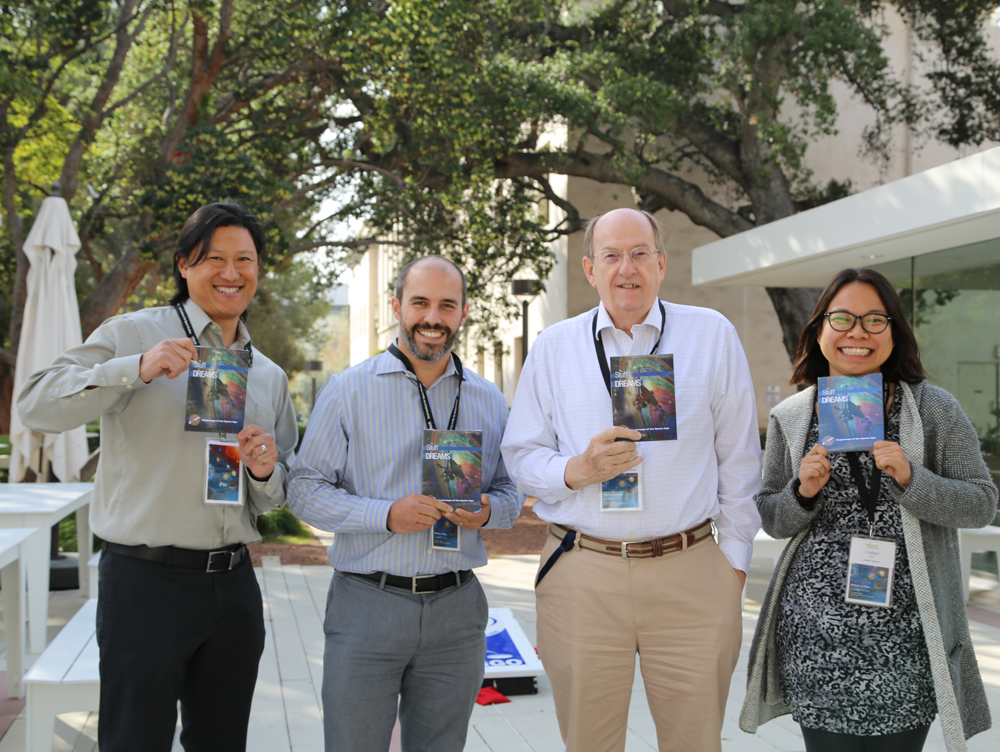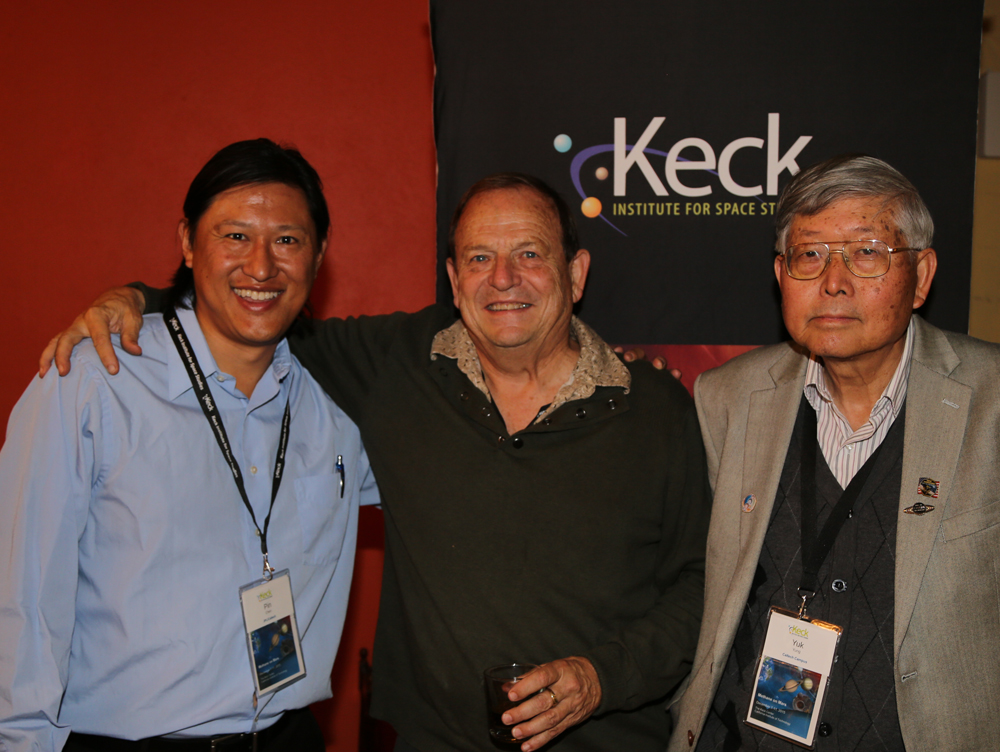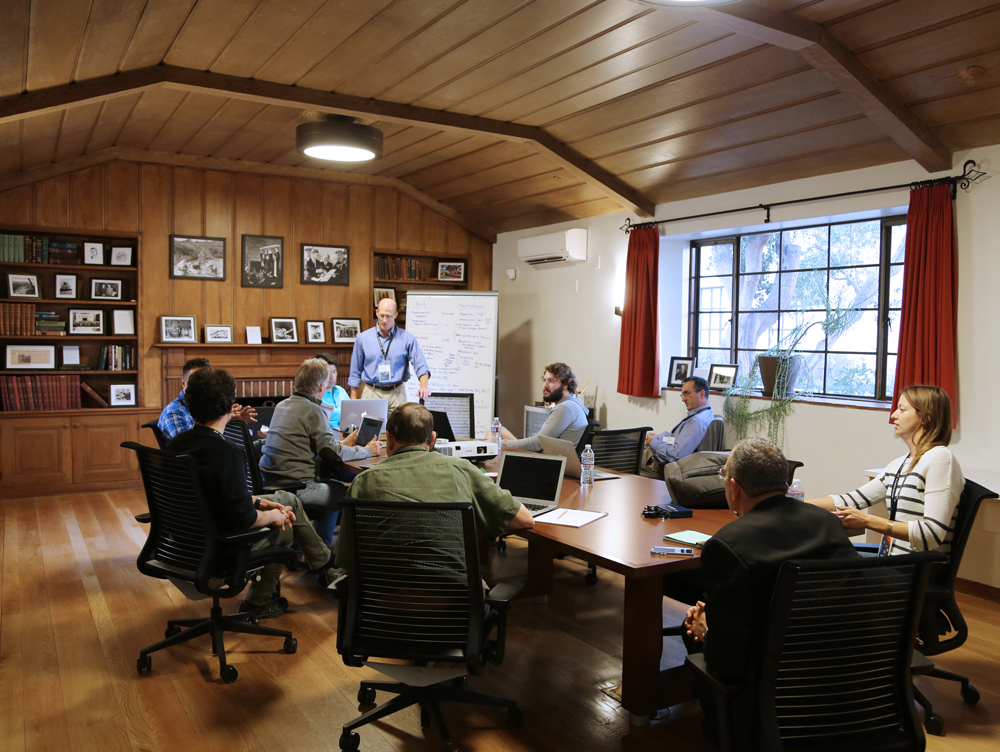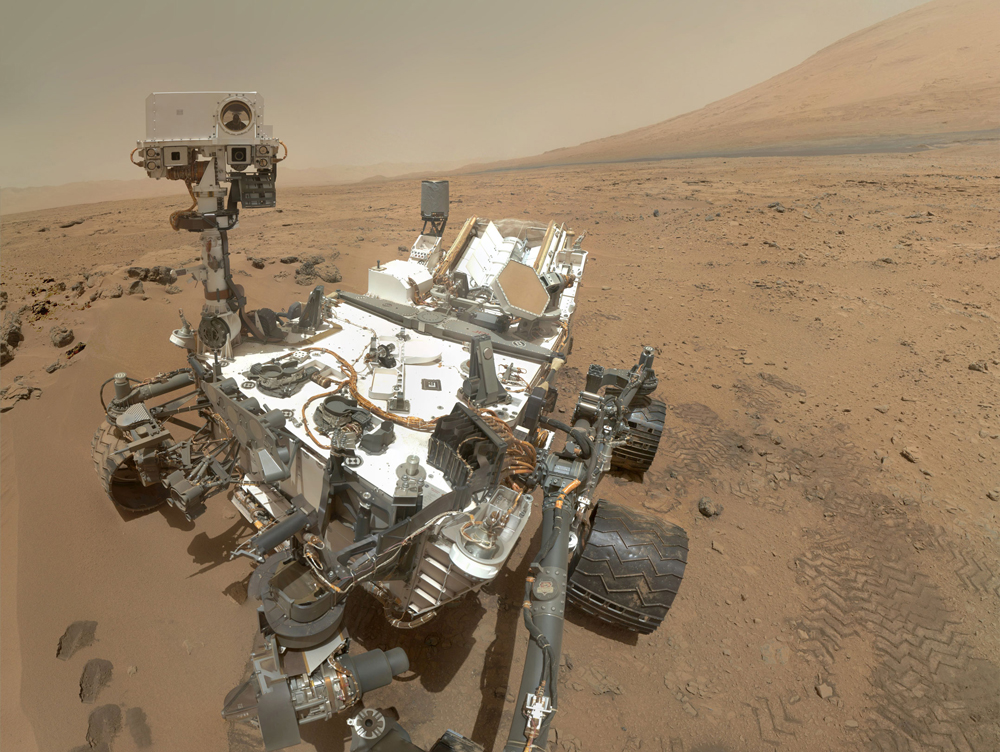Methane on Mars
December 7-11, 2015
California Institute of Technology - Pasadena, CA 91125
Final Report
Workshop Overview:
We will investigate and explore the best route for solving the profound puzzles arising from the recent ground-truth detection of methane on Mars by the Tunable Laser Spectrometer (TLS) onboard Curiosity [Webster et al. 2014]. This discovery reorients our understanding of the Martian environment and its potential for life.
The current theoretical framework of Mars does not entail any active source of CH4, and it is predicted to have a lifetime of ~300 years in the Martian atmosphere - far shorter than the planet's age [Summers et al. 2002, Nair et al. 2005, Atreya et al. 2007, Lefevre & Forget 2009]. Hence, methane's atmospheric existence requires a continually replenishing source, potentially subverting assumptions of a geologically and biologically dead Mars [Allen et al. 2006]. Furthermore, methane's high variability despite fast atmospheric mixing (compared to its atmospheric lifetime) defies explanation. This discovery necessitates a new era of research pursuing answers to the questions: What is generating methane, and how is it destroyed or sequestered on Mars?

This image illustrates possible ways methane might be added to Mars' atmosphere (sources) and removed from the atmosphere (sinks). NASA's Curiosity Mars rover has detected fluctuations in methane concentration in the atmosphere, implying both types of activity occur on modern Mars.
Under this program, an interdisciplinary group of experts will develop an exploration and technology-development strategy for resolving methane sources and sinks on Mars. Existing hypotheses of Martian methane sources include gas-water-rock chemistry and microbes (methanogens). If proven, the former implies the existence of environs offering liquid water and chemical sources of energy - i.e. habitability - while the latter implies the discovery of life on Mars. Solving these puzzles innately requires a concerted research effort across many disciplines and major technological advancements, including new measurement and exploration capabilities and methodologies. KISS's unique think-and-do-tank approach, along with Caltech/JPL's leadership in Mars exploration makes this program arguably the world's best platform for catalyzing the synthesis of a grand strategy.
Monday, December 7, 2015Salvatori Seminar Room - South Mudd Building, Caltech |
||
Short Course: Methane on Mars - The FundamentalsIntroductory Lectures - Open to all interested students, researchers and faculty |
||
Time |
Event |
Speaker |
|
8:00 - 8:30 |
Coffee and Refreshments |
|
|
8:30 - 8:40 |
Logistics / Introduction |
Michele Judd Yuk Yung |
|
8:40 - 9:20 |
Geology: History of Liquid Water on Mars |
Bethany Ehlmann |
|
9:20 - 10:00 |
Biology: Potential Life in the Martian Context |
Ken Nealson |
|
10:00 - 10:30 |
Break |
|
|
10:30 - 11:10 |
Atmospheric Dynamics: Martian Climate History |
Michael Mischna |
|
11:10 - 11:50 |
Atmospheric Chemistry and Methane Measurements |
Chris Webster |
|
11:50 - 12:30 |
Methane Attribution: Biotic and Abiotic Methane Sources and How to Differentiate Them |
Barbara Sherwood Lollar |
|
12:30 - 1:30 |
Informal Lunch Salvatori Patio and End of Short Course |
|
|
|
||
Invitation-Only Workshop Begins
|
||
|
1:30 - 2:00 |
Walk to Keck Center for Coffee and Registration |
|
|
2:00 - 2:45 |
Workshop Logistics and Introduction to KISS |
Michele Judd |
|
2:45 - 3:00 |
30 second Participant Introductions |
Michele Judd |
|
3:00 - 4:00 |
Vision and goals for the workshop |
Team Leads |
|
4:00 - 4:30 |
Break |
|
|
4:30 - 5:30 |
Begin plenary discussion on workshop format; organize lightning talks |
Team Leads |
|
5:30 - 6:00 |
Pack up and walk to Athenaeum |
|
|
6:00 |
Reception, dinner at the Athenaeum | |
Tuesday, December 8, 2015Keck Center - Think Tank, Room 155 | ||
Time |
Event |
Speaker |
|
8:00 - 8:30 |
Coffee and Refreshments |
|
|
8:30 - 8:45 |
Summary re-cap of day one and goals for day two |
Michele Judd Team Leads |
Lightning Talks |
||
|
8:45 - 9:10 |
Topical Question: “How certain is the existence of methane and Its geographic and temporal distribution on Mars?” |
Michael Mumma |
| 9:10 – 9:35 | Topical Question: “What are the required fluxes to explain the observations?” |
Franck Lefevre |
| 9:35 – 10:00 | Topical Question: “What are the potential methane sources and sinks?” |
Yuk Yung |
|
10:00 -10:30 |
Break |
|
10:30 – 10:55 |
Topical Question: “What are the characteristics of seepage, how to measure them, and what drilling technologies are available?” |
Giuseppe Etiope |
10:55 – 11:20 |
Topical Question: “What is our current state of understanding of thermal properties, transport/seepage, water abundances, aquifers, and possibility of high salinity aquifers that remain liquid throughout the Martian year?” |
Bethany Ehlmann |
|
11:20 – 11:45 |
Topic: “Deliquescence and 13CO2 isotope composition on Mars” |
Renyu Hu |
|
11:45 - 12:00 |
Discussion of Breakout topics |
Team Leads |
|
12:00 - 2:00 |
Poster Session and informal food truck dinner at the Keck Center |
|
|
2:00 - 2:45 |
MarsDrop |
Robert Staehle Sara Spangelo |
|
2:45 - 4:00 |
Breakout Groups |
All |
|
4:00 - 4:30 |
Break |
|
|
4:30 - 5:30 |
Breakout Groups |
All |
|
5:30 - 6:00 |
Report outs and Plenary Discussion |
All |
|
6:00 |
Optional no-host dinner in Pasadena (KISS to pay for postdocs and grad students) |
|
Wednesday, December 9, 2015Keck Center - Think Tank, Room 155 |
||
Time |
Event |
Speaker |
|
8:00 - 8:30 |
Coffee and Refreshments |
|
|
8:30 - 8:45 |
Logistics; Summary re-cap of day two and goals for day three |
Michele Judd Team Leads |
|
8:45 - 9:30 |
The ACS and NOMAD Instruments onboard the ExoMars Trace Gas Orbiter |
Francois Forget |
|
9:30 - 10:00 |
Lightni ng talk(s) |
TBD |
|
10:00 - 10:30 |
Break |
|
|
10:30 - 11:30 |
Plenary Discussion and select breakout topics |
All |
|
11:30 - 12:30 |
Brainstorm in small groups |
All |
|
12:30 - 2:00 |
Lunch at the Athenaeum |
|
|
2:00 - 3:30 |
Continue brainstorm in small groups |
All |
|
3:30 - 4:00 |
Break |
|
|
4:00 - 4:45 |
Group report outs |
All |
|
4:45 - 6:00 |
Plenary Discussion and select breakout topics for tomorrow |
All |
|
6:00 |
Optional no-host dinner in Pasadena (KISS to pay for postdocs and grad students) |
|
Thursday, December 10, 2015Keck Center - Think Tank, Room 155 |
||
Time |
Event |
Speaker |
|
8:00 - 8:30 |
Coffee and Refreshments |
|
|
8:30 - 8:45 |
Logistics: Summary re-cap of daythree and goals for day four |
Michele Judd Team Leads |
|
8:45 - 10:00 |
Lightning talks and determine new breakout group makeup |
|
|
10:00 -10:30 |
Break |
|
|
10:30 - 12:30 |
Breakouts |
|
|
12:30 - 2:00 |
Lunch at the Athenaeum |
|
|
2:00 - 3:00 |
Plenary report out of breakout groups |
|
|
3:00 - 4:00 |
Plenary discussion of what remains to be done before the end of the workshop |
|
|
4:00 - 4:30 |
Break |
|
|
4:30 - 5:45 |
Small group/ individual working session |
|
|
6:00 |
Dinner at the Athenaeum - spouses, significant others welcome |
|
Friday, December 11, 2015Keck Center - Think Tank, Room 155 |
||
Time |
Event |
Speaker |
|
8:00 - 8:30 |
Coffee and Refreshments |
|
|
8:30 - 8:45 |
Logistics and Objectives |
Michele Judd Team Leads |
|
8:45 - 10:00 |
Final plenary discussion |
|
|
10:00 -10:30 |
Break |
|
|
10:30- 11:30 |
Report out and finalization of interim topics of study |
Study Leads |
|
11:30 - 12:00 |
Action plan for interim session - what needs to happen by September? |
Study Leads |
|
12:00 - 12:30 |
Workshop closeout |
Michele Judd |
|
12:30 |
END of workshop |
|
Workshop Participants:
- Patrick Beckett - JPL/Caltech
- Pin Chen - JPL/Caltech
- Bethany Ehlmann - Caltech Campus
- John Eiler - Caltech Campus
- Giuseppe Etiope - Istituto Nazionale di Geofisica e Vulcanologia
- Francois Forget - CNRS
- Peter Gao - Caltech Campus
- Renyu Hu - JPL/Caltech
- Armin Kleinboehl - JPL/Caltech
- Franck Lefevre - CNRS
- Charles Miller - JPL/Caltech
- Michael Mischna - JPL/Caltech
- Michael Mumma - NASA Goddard Space Flight Center
- Kenneth Nealson - University of Southern California
- Mitchio Okumura - Caltech Campus
- Ronald Oremland - US Geological Survey
- Victoria Orphan - Caltech Campus
- Michael Russell - JPL/Caltech
- Linhan Shen - Caltech Campus
- Barbara Sherwood Lollar - University of Toronto
- Vlada Stamenkovic - Caltech Campus/JPL
- Daniel Stolper - Princeton University
- Chris Webster - JPL/Caltech
- Paul O. Wennberg - Caltech Campus
- Michael Wong - Caltech Campus
- Yuk Yung – Caltech Campus
Short Course Presentations |
|
|
B. Ehlmann, |
The History of Liquid Water on Mars |
| K. Nealson, USC |
Life in the Martian Context (758 KB .pdf) (video) |
| M. Mischna, JPL/Caltech |
Atmospheric Dynamics: Martian Climate History (3.87 MB .pdf) (video) |
| B. Sherwood Lollar, University of Toronto |
Differentiation of Biotic and Abiotic CH4:
Lessons from terrestrial analogs (8 MB .pdf) (video) |
|
C. Webster, |
Atmospheric Chemistry and Methane Measurements |
Workshop Presentations |
|
| S. Atreya, University of Michigan |
Origin of Mars methane, now or in the past (4 MB .pdf) |
B. Ehlmann, |
Some background on (1) Martian heatflow, (2) water and physical properties of the Mars subsurface, (3) water‐rock reactions, (4) places of escape of methane |
| G. Etiope, Istituto Nazionale di Geofisica e Vulcanologia |
Potential CH4 seepage on Mars (23.4 MB .pdf) |
| F. Forget CNRS |
The Exomars Trace Gas Orbiter and the search for Methane (7.56 MB .pdf) |
| R. Hu JPL/Caltech |
Hypotheses for Near-Surface Exchange of Methane on Mars (4.5 MB .pdf) |
| F. Lefèvre, LATMOS, Paris |
Martian methane: Fluxes, Lifetimes etc (4.53 MB .pdf) |
| C. Miller, JPL/Caltech |
Methane on Mars: Arctic Methanogenesis Analogs (279 KB .pdf) |
| M. Mumma, NASA Goddard Space Flight Center |
Methane on Mars: Spatial & Temporal Variability Mars Organics Observer |
| R. Oremland US Geological Survey |
Cryptic Anaerobic Oxidation of Methane (CAMO) |
| R. Popa, USC |
SPEAR: Solitary Probe for Electrochemical Analysis and Reporting or Subsurface Penetrator for … (1.39 MB .pdf) |
| M. Russell JPL/Caltech |
Workshop Notes (77 KB .pdf) |
| L. Shen Caltech Campus |
Methane Source and Sink Attributions Using Cavity Ring-down Spectroscopy (1.72 MB .pdf) |
| R. Staehle and S. Spangelo JPL/Caltech |
MarsDROP for Getting Small Payloads to Mars’ Surface: How many would you like, and where would you like them to help resolve questions about methane on Mars? (8.14 MB .pdf) |
| P. Wennberg, Caltech Campus |
An Introducton to the Mars Atmospheric Trace Molecule Occultaton Spectrometer (MATMOS) (7 MB .pdf) |
Y. Yung, |
Methane on Mars Study Program - Vision and Goals |
Poster Session |
|
| G. Etiope, Istituto Nazionale di Geofisica e Vulcanologia |
Fast Abiotic Production of Methane At Temperatures <100°C |
| M. Mumma, NASA Goddard Space Flight Center |
Methane and Related Trace Gases on Mars during 2003-2015, and planned extensions through 2016 (41.4 MB .pdf) |
M. Russell |
Fluctuation relations, bioenergetics and the emergence of life |
| Vlada Stamenkovic Caltech Campus |
Geodynamically Driven Temporal & Local Formation of Hydrogen & Hydrocarbons (3 MB .pdf) |














